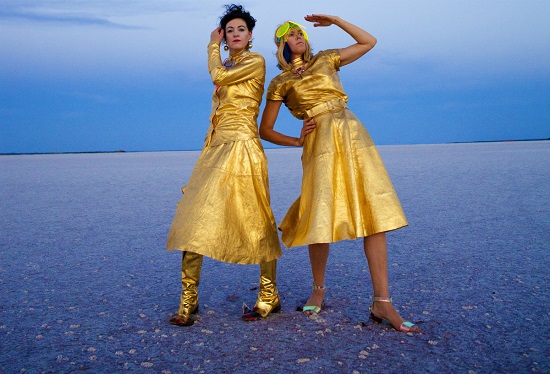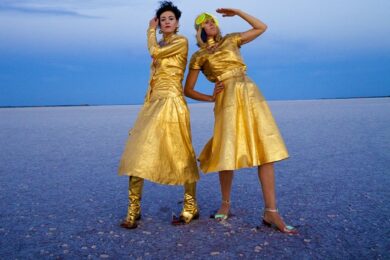Melissa Logan isn’t the person I expected to meet. On record and in performance the co-founder of art-house electro ensemble Chicks On Speed can come across as intimidatingly high-brow, the sort of musician who will cram 15 avant-garde references into a lyric and exists in an intellectual slipstream entirely of her own devising. The sonic futurescapes Logan devises with COS collaborator Alex Murray-Leslie are chilly, wry and sometimes slightly terrifying. So you expect she will be too.
In person, though, soaring pretension is in meagre supply. Her conversation voice is warm and earthy; the German-resident New Yorker isn’t above waxing esoteric yet there’s a groundedness as well and we end up talking about the World Cup. The crossroads between art and pop is an exceedingly esoteric place. Logan and Murray-Leslie seem to inhabit it on their own terms.
She is speaking as the band unveil details of a new album, Artstravaganza. Out in October, it promises to exist in their rich tradition of glittering, high-IQ dance-pop – a tradition that stretches back to their part in the glammy electroclash scene of the late ’90s. We already have the single ‘Utopia’ a socio-political rumination strip-lit with a quicksilver groove.
Your new single, ‘Utopia’, features a spoken-word snippet from Yoko Ono. How did the collaboration come about?
Melissa Logan: We played with her before, at the B-52’s silver anniversary in New York [in 2002]. At the time, she had a lot of bodyguards around – it was very hard to approach her. We wanted to work with her and she ignored us. So we went to a lecture [Ono was giving] and recorded her and put it on the ‘Utopia’ song. We were like naughty school-kids. We wanted her attention basically.
Are you concerned at what her response might be?
ML: Peter Weibel [noted Austrian artist], who is also on the new record, said, ‘Don’t worry.’ He’s friends with her music manager and there’ll be no problem. I guess we’re covered.
The song seems to ask the question, is utopia something to strive for or fear?
ML: Utopia as a concept has been with us for a long time. It’s 500 years or so since the phrase was coined. You can see drawbacks to the notion; this deep desire [for paradise on earth] can be used against people, it can manipulate them.
You have also announced a new album, Artstravaganza, to be released in October. One of the tracks include a sample of Julian Assange, the Wikileaks founder, recorded at the Ecuadorian Embassy in London, where he has resided since Ecuador granted him asylum. What were the circumstances behind his involvement?
ML: We went to a talk he gave. He wasn’t in the embassy yet – he had the anklet on [Assange was under house arrest and required to wear an electronic tag]. This was a few weeks before [he sought asylum]. After that, Angela Richter, the theatre director, kept in touch with him – they did hundreds of hours’ of interviews over the phone and face to face. She asked Julian [if it was permissible to sample some of the recordings] and got the okay.
What was he like on a personal basis?
ML: He was pretty angry at Sweden of course [Assange is wanted in Sweden for questioning regarding an alleged sexual assault]. You know there is a strange misogyny in the hacker scene. I think it’s to do with people who are very isolated and close to their computers – physical interaction with the opposite sex becomes strange. It’s weird nobody talks about it. There’s all this [discussion of] human rights and freedom of information – and yet there is this funny awkwardness. Some people who are very advanced mentally, when it comes to sex… it’s a very odd, pre-teen situation. However, Julian is not like that. The FBI does this thing of [focusing on] sex problems. To demonise people because they have sex. It’s something to use against people in an uptight society. Personally our relationship with Julian was really cool and great, because he is standing up for human rights.
Can his presence on the record be interpreted as a protest by Chicks On Speed against blanket government surveillance of the internet?
ML: People have been talking about surveillance for a long time. It always felt like a conspiracy theory. Of course, now the ‘conspiracy’ part is gone: there is very detailed information about the mostly illegal things happening to us… But then, one starts to think about the isolation many of us feel. Being watched – is that really more of a problem than being completely ignored and isolated, accompanied by just ones’ gadgets? Perhaps we are more paranoid about being ignored and lonely. It’s an idea that is growing into our next album.
In tandem with the single, you are releasing six interactive iPad apps. Do you view the apps and the music as part of a single wider experience?
ML: I would say it’s a parallel thing. We don’t just use new technology, we also use very old technology. What we do is a combination of the two. We have designed a high-heel shoe that can be played as a guitar. So it is something that is wearable and playable : a wearable instrument. And then we develop that idea into an app.
In addition to music you are plugged into the worlds of art and fashion…
ML: We are not connected to the fashion world at all. The fashion world has a certain thing of its own. It is nothing we would fit into.
But you’ve worked with (designer and photographer) Karl Lagerfeld…
ML: He shot a cover for us for the [2003] album Fashion Rules. We talked about him in the song. We asked, ‘Would you like do to this record – you’re in the song?’ It sounds like we’re laughing at the fashion world – we are a little bit. But he did the cover. Right away he said, ‘Okay I can see you guys have this Berlin-style cheeky attitude.’ He has good reflexes, reads people very fast.
You and Alex started Chicks On Speed at art-school in Munich in the early 90s. Was it a shock transitioning from what can be a very Delphic world to the music industry?
ML: Music was a huge liberation. The art world seemed stifling. We were really ecstatic… And of course, it was glamorous, flying from country to country. Music wasn’t stultifying at all.
When Lady Gaga started banging on about ‘art-pop’ and name dropping prominent visual artists, did you feel she had stolen your figurative clothes in some ways?
ML: I think she is very busy looking at a lot of things. I know she was a Facebook friend of Peaches [Berlin-based Canadian electro provocateur] for a long time and keeping an eye out on interesting things going down. We all influenced each other. I wouldn’t say [Gaga was borrowing from] us – it’s Madonna, Peaches, B-52s. Every month another thing is absorbed and spun out at a very quick pace.
You’re American but live in Hamburg…
ML: Actually, I’ve just moved to Cologne…
At any rate, what was it like to experience the World Cup as a US citizen in Germany?
ML: It’s funny. The German patriotism was so strong. I tried to do a little bit of ‘U. S. A.’ [chants initials in German accent]. The thing is, the USA v Germany game was so bad and boring – nobody deserved to win. I was a little disappointed. Amongst all the German fans, I wanted to be the one singing ‘U.S.A.’ with my strong American accent. There is a saying in Germany: ‘Better football than war.’ They are very serious about it. There is a strange tension around it.
Utopia is out now. Artstravaganza is released October 3



